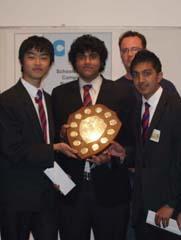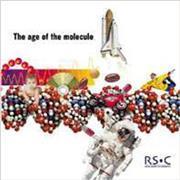A team of Year 12 chemists from Loughborough Grammar School win the coveted National Schools' Analyst Competition shield.

During the summer a team of Year 12 chemists from Loughborough Grammar School won the coveted National Schools' Analyst Competition shield, and £750 for their school, at the 2008 final held at Bangor University in North Wales. Sponsored and run by the Royal Society of Chemistry's (RSC) Analytical Chemistry Trust Fund, with additional support from other RSC interest groups, Gaia Technologies, LGC, Sigma-Aldrich and Siemens Medical Solutions Diagnostic, the competition is open to teams of three AS-level or equivalent chemistry students.
This year 16 teams from schools and colleges across the UK competed in the final, the Loughborough team of Andrew Zhao, Nikesh Sharma and Kunaal Shah proving too strong for finalists from Bristol Grammar School and Manchester Grammar School, which claimed the £500 second-place and £250 third-place prizes respectively. Following consultations with the managers of the Analytical Chemistry Trust Fund, an additional £250 third-place prize was awarded to a team from Stockton-on-Tees Sixth Form College, which came a very close fourth. The individual team members for the first three teams all received book tokens, and the team from Stockton received copies of the RSC book, The age of the molecule.
The competition is designed to illustrate the important role of analytical chemists and introduce students to unfamiliar analytical techniques. For this year's final the three practical challenges were set in the context of environmental issues associated with the examination of a contaminated industrial site. The competitors were provided with liquid and solid samples to analyse using HPLC, GC-MS and volumetric techniques. For two of the experiments, the teams had to prepare the samples using solvent and solid-phase extraction methods prior to starting their analyses. The finalists were assessed on their skills, understanding and accuracy, team work, and safety in the laboratory.
The 2009 final will be held at the University of Plymouth in June. For further information on how to enter a team from your institution visit the competition website. [Link no longer available}
The age of the molecule
Synopsis

The achievements and excitement of chemistry are evident in our everyday lives. Scientific research has not only led to cures for serious diseases and produced life-enhancing synthetic materials, but has also offered profound insights into the nature of the world around us. In this way, chemistry has made a huge impact on human progress in the 20th century. We can expect even more exciting developments in the new millennium.
Illustrated in full colour, this book describes the key developments in the molecular sciences in recent years and those likely to happen in the near future. These include the many remarkable discoveries made in the life sciences, and the huge variety of technological applications of chemistry: liquid crystals, batteries, catalysts, plastics and novel electronic materials. The book also explains how chemistry is actually carried out: methods of making and analysing molecules, calculating their properties and studying how and why chemical reactions occur.
Endorsed by Prime Minister Tony Blair and written in clear accessible language by a group of leading chemists, The Age of the Molecule will appeal to anyone who wants to understand the world and ourselves at the molecular level.
Review Extracts
...a very useful resource and a mine of information
Biochemistry and Molecular Biology Education
beautiful layout...well worth reading
The Alchemist
Brief Contents
- Introduction
- What is Chemistry?
- Make Me A Molecule
- Analysis and Structure of Molecules
- Chemical Marriage - Brokers
- Following Chemical Reactions
- The Power of Electrochemistry
- The Age of Plastics
- The World of Liquid Crystals
- New Science from New Materials
- Computational Chemistry and the Virtual Laboratory
- The Chemistry of Life
- Epilogue
- Chemistry - Architecture of the Microcosmos.
Notes
Customers who wish to obtain an Adoption Copy of this book in order to assess suitability as a student text should contact the Manager Sales and Customer Services at our Cambridge address.






No comments yet